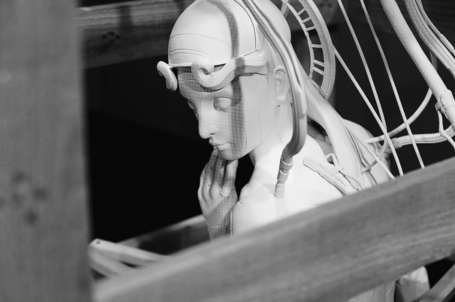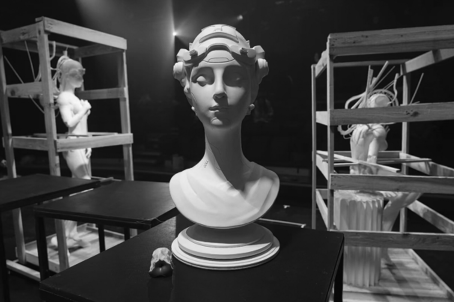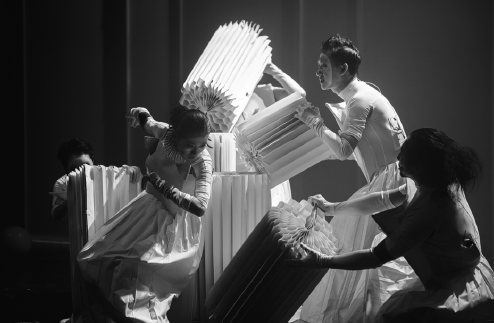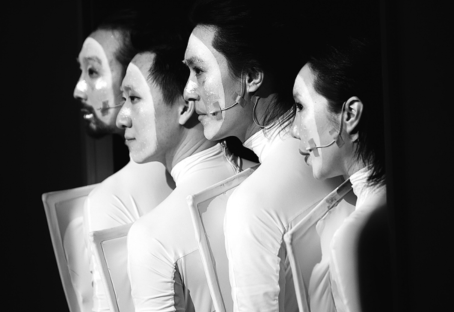Electric agenda puts emotion center stage
An innovative play blends conceptions of Shakespeare's female characters and explorations of virtual human development, Li Yingxue reports.

A rhythmic heartbeat echoes beyond the dimly lit stage and throughout the theater. As the lights brighten, a company named Shakespeare Holdings comes into view. They're working on a unique project: crafting emotionally supportive electronic plants inspired by female characters from Shakespeare's plays.
This sets the scene for the play, Shakespeare's Garden. Despite the name, it's not a tale about Shakespeare's love life or his female characters as a group. Instead, it delves into the intersection of technology and emotions.
Characters like Ophelia, Cleopatra and Lady Macbeth take center stage. They are intertwined into the 24-hour life of an employee, known as A, at Shakespeare Holdings. The play explores the mix of classic and modern elements, workplace realities and childhood traumas, and the contrast between vivid human emotions and emotionless electronic plants.
Ultimately, it delves into deep reflections on self, soul and creation.
Shakespeare's Garden premiered at the end of December at the small theater of the National Theatre of China in Beijing as part of the 16th Beijing International Youth Drama Festival in 2023.
This debut work is helmed by young director Nie Jingzhu, with a cast of talented young actors, including Zhang Yamei, Wang Yao, Li Chenyang and Wang Linshan. The script was written by up-and-coming playwright Huang Bing, while various aspects like stage design, music, lighting, multimedia, costumes and makeup were handled by a team of talented young artists.
Nie jokes that: "Perhaps even Shakespeare had a team akin to the Shakespeare Holdings. I'm fortunate to have an outstanding team of individuals, each excelling in their respective artistic fields. It's the synergy of our talents and mutual support that has brought forth this captivating stage presentation."
The play is divided into three parts, each featuring a key female character from Shakespeare's works: Ophelia, Cleopatra and Lady Macbeth.
Huang noticed these women are in many ways unique but share similar fates.
"We found that, no matter how significant their roles or distinct their personalities, Shakespeare's female characters exist somewhat isolated from the main theme onstage," she says. "They stumble through the plot until the final curtain falls."
The play portrays the challenges and conflicts that arise when machines attempt to simulate the complex workings of human emotions, exploring the intricacies of the human mind.
According to Nie, the various female characters in Shakespeare's works face different challenges leading to their tragic outcomes. Unlike the grand tragedies of ancient Greece that focus on the downfall of the powerful, Shakespeare's characters feel more like real people, prompting contemplation on human nature.
"Our focus is on Shakespeare's female characters set against the backdrop of the artificial intelligence era," the 43-year-old director explains.
"During this time, artificial beings learn rapidly through technology but lack emotion and appear cold. We use extreme human emotions to teach them to feel. What happens when an artificial being, filled with Shakespearean drama and experiencing human emotions, comes to life?"
Huang emphasizes that the play's essence isn't in finding answers but in how people choose to embrace differences.
"It's about treating Shakespeare's text as tangible material and seeing women's emotional journeys as natural processes of change and creation, rather than a flaw in need of correction," she says.
The most significant challenge for the performers in Shakespeare's Garden is grappling with the question, "Who am I?"
The characters in the drama lack names and much of a past, and are identified only by labels like A, B, C, D, or such roles as "woman" or "ghost". Most don't even have complete storylines.
From the very first rehearsal, the six actors have been exploring their characters' identities and pondering the interplay of body and soul. Onstage, they shift between being cold and heartless to outbursts of intense passion. Through these powerful performances, the audience witnesses the struggle between body and soul, revealing the complex realities of lives with or without emotions.
Zhang Yamei, who plays A, remembers facing challenges during rehearsals. She constantly worked on making the somewhat unclear lines understandable and memorizing them until they became second nature, so that she gradually connected with and understood her character.
The stage setting and multimedia presentation reflect Nie's strong personal style.
Theater critic Cui Lei believes Nie has designed the visual elements of the play with simplicity and precision.
"The multimedia visuals expand the theatrical space," Cui explains. "The costumes and props predominantly use white, black and red, creating a futuristic sense of artificial intelligence along with a coldness arising from the disconnection between body and mind."
Previously, Nie was a well-known theater poster designer. She graduated from the Central Academy of Fine Arts, specializing in visual communication. She organized poster installation art exhibitions in Beijing in 2017 and 2019, and her work has been displayed at prestigious events like the Florence Biennale and the Venice Architecture Biennale.
Nie had a strong connection to theater before directing her first play and served as the graphic visual director for such events as the Beijing Youth Drama Festival and the Wuzhen Theatre Festival.
"Designing posters for plays is like staging a performance on paper, turning paper into a stage. It's a three-second art and needs to capture the essence of the play in that short time, encouraging the audience to step into the theater and buy tickets," she explains.
"The theater has always been incredibly captivating for me. It's a blend of various contemporary art forms — design, acting, directing, lighting, music, stage design and visual arts."
In April last year, she organized a metaverse theater festival that brought together tech companies working on metaverse, AIGC (AI generated content) and virtual human development. The event aimed to explore how theater arts could merge with technology.
In July last year, she decided to create a play and started collaborating with Huang on the script.
"The way the script is brought to life changes every day. Sometimes, a single image sparks new ideas, serving as a clue to gradually develop the storyline," Nie says.
"Transitioning from two-dimensional to three-dimensional creativity is quite challenging. What used to involve solving just two or three issues now requires addressing more than 20 or 30.However, I find this challenge has brought me a unique experience and a renewed sense of enjoyment."
She felt a bit nervous and unsure about directing a play for the first time. Encouragement from renowned theater director Meng Jinghui helped her approach the challenge more confidently.
"Meng told me: 'You don't need to overthink what the final outcome of this play will be. It's a culmination of the books you've read, the people you've met and the various experiences you've had'," Nie recalls.
"As a creator, there are times when I feel like I have nothing new to say to the world. However, with Shakespeare's Garden, I get to express what I truly want to say," Nie says about her initial inspiration when stepping into directing.
"Whether it's real people or these 'electronic plants', both can become soulless shells. Exploring how to break free from the constraints of language, classics, instructions and trauma, and allowing the body to have a real soul — these are some of the themes I want to delve into with this play," she adds.




Today's Top News
- Xi taps China's deep wisdom for global good
- New rules aim for platforms' healthy growth
- Chinese web literature grows overseas
- Postgrad exam trend points to thoughtful approach
- World's highest urban wetland a global model
- How China's initiatives are paving a new path to a better world






























